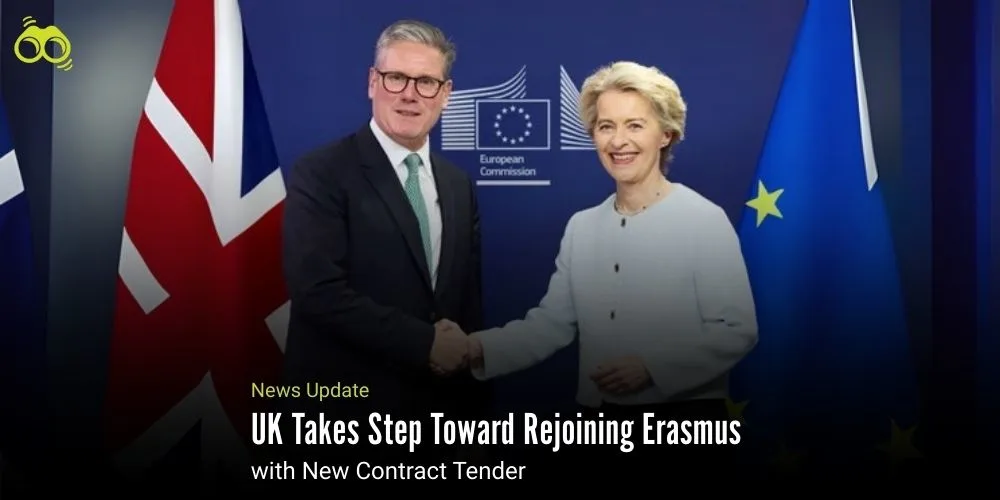Erasmus Reassociation Back on Agenda as UK Seeks Improved Financial Terms
DfE Issues Tender to Relaunch EU Student Mobility Programme from 2026
In a development that has reignited interest across education and policy sectors, the British government is reportedly laying the groundwork to rejoin the EU’s flagship Erasmus student exchange programme. As outlined in recent subscription news updates, the Department for Education (DfE) has issued a tender notice proposing an 18-month contract, valued at up to £24 million, for a private provider to manage the scheme from July 2026. This initiative follows the broader UK–EU “reset” agreement reached earlier this year under the Labour government, led by Sir Keir Starmer. As part of this diplomatic recalibration, provisions were made to initiate negotiations on the UK’s re-association with Erasmus, a programme widely acknowledged for its contribution to academic mobility, research collaboration, and soft power diplomacy. Indeed, those consulting the digital edition of policy briefings may recall that Britain’s European relations minister had previously expressed openness to re-engaging with the scheme.
Since its inception in 1987, Erasmus has evolved from a university exchange programme into a multifaceted platform encompassing work placements, vocational training, and cross-sector learning. Education analysts who regularly read more through government updates and share news across academic networks have observed that the scheme’s budget is projected to increase by 50 per cent in the next cycle, spanning 2028 to 2034. Nevertheless, EU member states are expected to negotiate this figure before finalising contributions. The DfE has made clear that any UK participation would be contingent upon securing significantly improved financial terms. This position echoes concerns raised in 2021, when the government declined to rejoin Erasmus due to a projected net cost of £2 billion, largely attributed to the historic imbalance in student flows between the UK and the EU. Those who subscribe to newspaper coverage of education policy may recall that the UK subsequently introduced the Turing Scheme, a more modest exchange initiative with a reduced budget of £78 million for the 2025–26 academic year.
Sector representatives, including Jamie Arrowsmith of Universities UK International, have welcomed the government’s renewed interest in Erasmus. He cited research indicating that students who study, work, or volunteer abroad tend to achieve enhanced academic and employment outcomes. His comments have been widely featured in home magazine articles and digital reading platforms focused on higher education reform.
For readers seeking a broader context, this story aligns with other stories to read concerning international collaboration, student mobility, and the evolving nature of UK–EU relations. It also resonates with themes explored in books about reading, books in management, and books on entrepreneurship, which examine how global partnerships influence workforce readiness and innovation. As the UK continues to navigate its post-Brexit educational landscape, the potential return to Erasmus represents a renewed opportunity for learners and staff to engage with international networks. Those who discover subscriptions to policy journals or read a book on European integration will find this development particularly relevant to ongoing debates around access, equity, and global engagement.
Moreover, for those monitoring economic subscription trends in education, the Erasmus re-entry discussions reflect a broader effort to align national programmes with international standards, an issue frequently addressed in finance books to read, books young adults should read, and books most read in the world on public policy and institutional reform. This initiative underscores how education, diplomacy, and funding continue to converge in shaping the future of student opportunity.
Editor’s Note:
The prospect of the UK rejoining Erasmus marks far more than a technical policy adjustment; it signals a potential turning point in the country’s approach to international education. Long recognised as one of Europe’s most influential programmes, Erasmus has facilitated student mobility, research cooperation, and cross-border learning since 1987. Against the backdrop of Brexit and the UK’s earlier withdrawal, renewed engagement with this initiative carries symbolic as well as practical weight. The Labour government’s broader “reset” with the EU provides the political foundation for this move. By initiating exploratory steps through the Department for Education’s tender notice, the government has aligned its education strategy with a recalibrated foreign policy agenda. Financial considerations remain central, however, with officials insisting that any agreement must secure fairer terms than those rejected in 2021.
For students, the return to Erasmus could significantly widen access to study, training, and volunteering abroad opportunities linked consistently with higher academic attainment, stronger employability, and deeper cultural understanding. For universities, renewed participation would offer expanded partnerships, research collaborations, and international visibility, positioning them more strongly within the global higher education landscape. Sector leaders, including Universities UK International, support outward mobility, citing its lasting benefits for individuals and institutions. This aligns with the consensus on embedding career-focused, globally oriented experiences in higher education. This development is also relevant to discussions about the Turing Scheme and the UK's ability to create its own mobility initiatives. The core principle remains equitable access to international opportunities, preparing graduates for a connected world.
Skoobuzz underscore that the Erasmus question touches on more than budgets or bilateral agreements; it reflects how the UK defines its place in global education, how it addresses issues of equity in access, and how it leverages international partnerships to shape future-ready graduates.














0 Comments (Please Login To Continue)